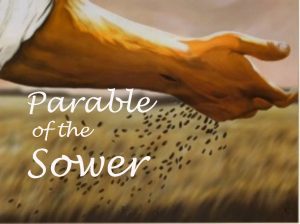The Gospel of Matthew, chapter 13:1-23
Jesus was a master storyteller. There’s no doubt that His most effective form of storytelling was the parable. A parable is a story with a religious message. In the gospel of Matthew, chapter thirteen, the Lord tells the parable of the sower.
This parable talks about a farmer who sowed seed on a footpath, on rocky ground, among thorns and, finally, on good soil.
The farmer represents almighty God; the seed is His Holy Word; and the ground illustrates the human condition with all its complexity.
Well, no sensible farmer would waste his seed by planting it on a footpath where it would be eaten up by birds or on rocky ground where there was no soil or among thorns where it would be choked to death. He would naturally sow his seed in good soil where it could produce a bountiful harvest. Why then does the Lord tell this parable which, at first glance, appears to be unreal and not credible?
This parable should not be taken literally, but rather it should be taken metaphorically since it represents God’s merciful action in the lives of all His people.
It is surely no surprise to us then that the disciples asked Jesus the meaning of this parable? The Lord explains:
1. The seed along the footpath represents “those who hear the message about the kingdom” without understanding it. It goes in one ear and out the other, and because there is no understanding of the word, it produces no fruit, offers no results. It has fallen on deaf ears. The “evil one snatches away what was sown in them.”
2. The seed that falls on rocky ground represents “those who receive the message gladly” in the beginning. But, since it does not take root in them, they fall away as soon as “trouble or persecution” come along.
3. The seed that falls among thorns represents those who hear the message and appreciate it but are overpowered by “worries about this life and the love of riches” which choke the message.
4. Finally, the seed sown in good soil represents those who “hear the message and understand it.” Those are the people who “bear fruit” according to their capacity – “a hundred or sixty or thirty-fold.”
This lovely parable of the sower addresses the different responses or lack thereof from people to Jesus’ message. Of the four types of responses to the Lord’s message in this parable, there is only one response that is worth having and that is the last one which addresses those who hear the message, understand it and bear fruit, according to one’s capacity.
The Lord continually reminds us throughout the gospels that there is only one response He requires. It is the same as the final response we find in today’s parable of the sower; and that is the response of his faithful followers:
“Blessed are those who hear my word, and keep it.”
Fr. Hugh Duffy








Recent Comments